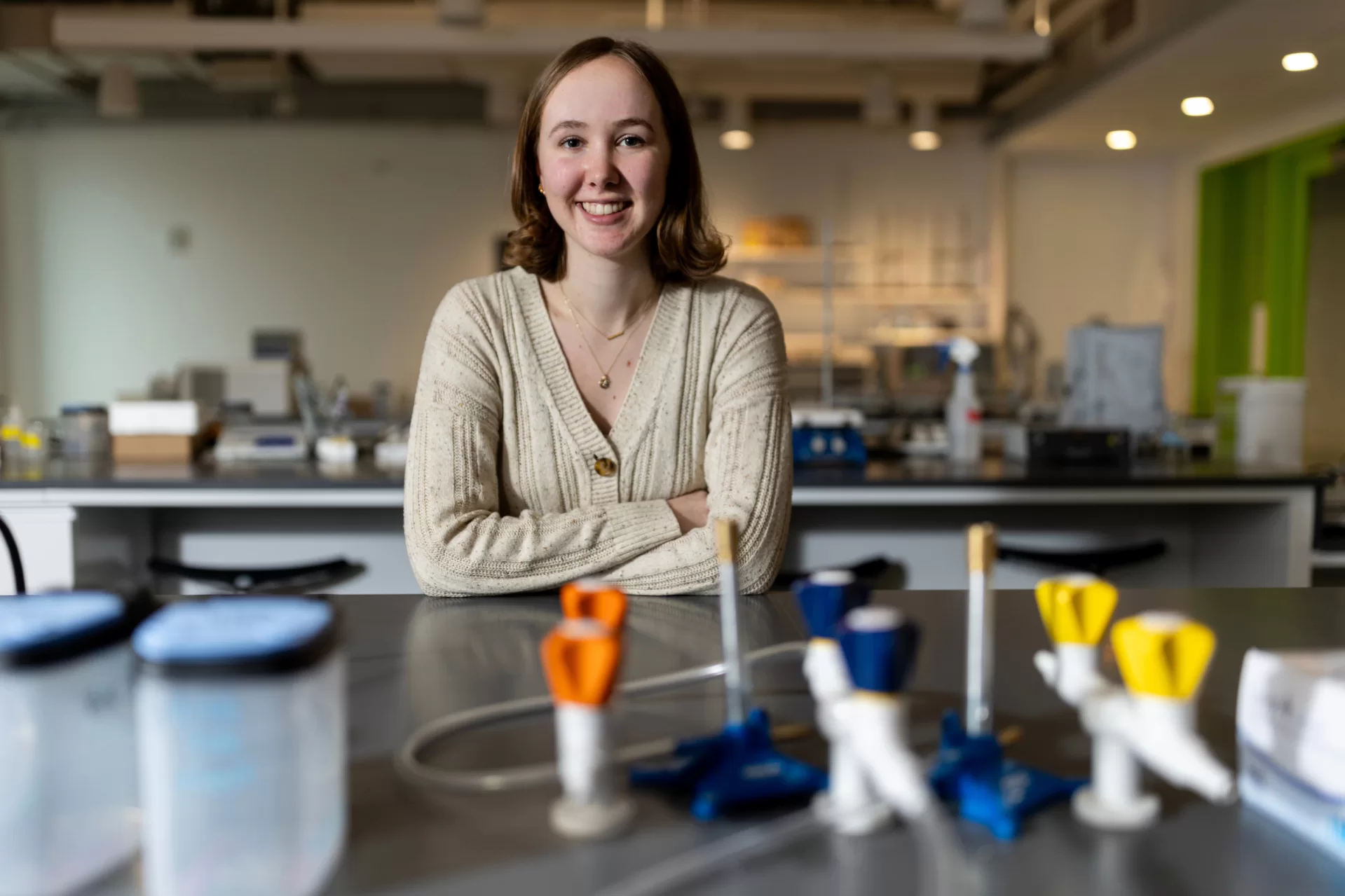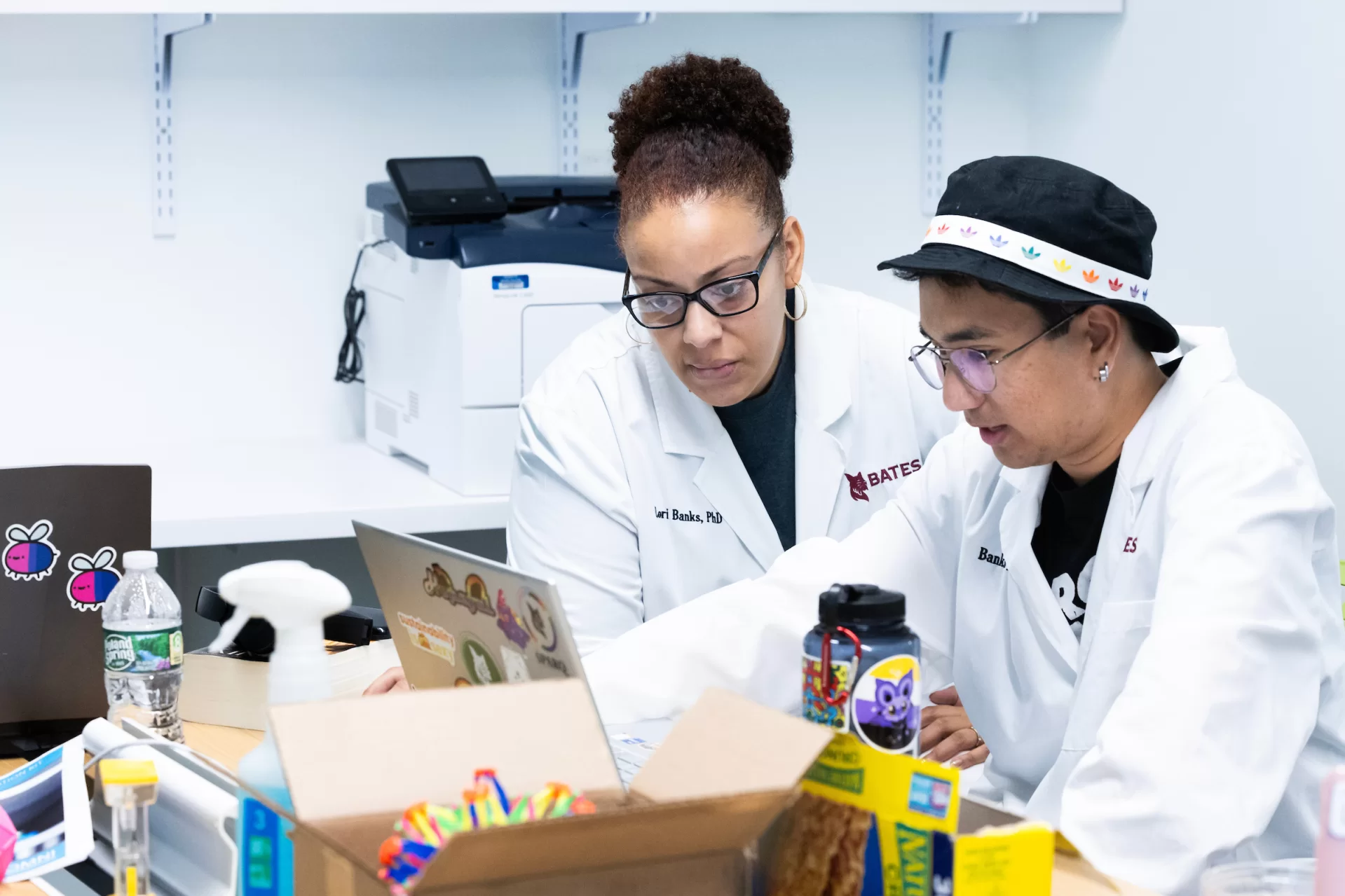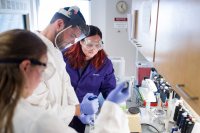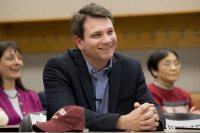
Emily Scarrow ’25 knew she wanted to go into medicine since high school, but six weeks into her first year at Bates, she was diagnosed with cancer. At age 18, she was forced to return home to Washington, D.C., for treatment.
“I spent most of that year at home,” said Scarrow, who was diagnosed with stage two Hodgkin’s lymphoma. “I was sent home in October and came back in March.”
Rather than deterring or derailing her, the experience narrowed Scarrow’s focus, grew her determination, and deepened her positive attitude toward her goal to advance medicine. It also helped her land a prestigious Barry Goldwater Scholarship.
Congress established the Barry Goldwater Scholarship and Excellence in Education Foundation in 1986, eponymously named to honor the longtime U.S. senator from Arizona. The award provides funding to college sophomores and juniors who intend to pursue research careers in the natural sciences, mathematics, and engineering.

Scarrow wants to go to medical school and also work in clinical research immediately after she graduates from Bates to help inform her future work as a physician.
Specifically, her goal is to “improve lives using holistic human-focused research as a physician” that can be implemented “in the real world to help people.”
Working in the lab is often separated from patient care, Scarrow said. “I’m really interested in being able to combine research with clinical care. So often, it’s one or the other. It’s very important to me to focus on the quality of the patient experience, but also the research is important in my journey,” Scarrow said.
For most of her first year at Bates, Scarrow lived at home in Washington, D.C., where she could get treatment for her cancer every other week at Georgetown University Hospital. She worked with Bates professors taking two virtual classes each semester. “I could not be where I am if it were not for the support I got from Bates,” she said.
She then caught up with classes over the summer at Georgetown University so she could stay on track to graduate next spring as a biology major with a minor in chemistry. All the while, she doubled down on her commitment to excel in science research, focusing on gaining needed experience in the lab.
In her Goldwater application, Scarrow wrote about being the beneficiary of medical research, and how that fits with her goal of being a researcher-physician.
“I personally experienced the implementation of translational research into my care routines. My life was saved by decades of work done in labs around the world. For my future, it is not that research is needed to be a good physician. It is, instead, that being a doctor is the best way to complete the patient-focused research I will conduct,” Scarrow wrote.
“She kind of doesn’t see any limits, which I absolutely appreciate about her.”
Lori Banks
Throughout her time at Bates, Scarrow has sought experiences in the medical field. She is a member of Bates EMS as an emergency medical technician and responds to calls on campus. While studying abroad in both Chile and Denmark, she pursued study in the health care systems in those countries.
She also is a First Connection volunteer with the Leukemia and Lymphoma Society helping recently diagnosed patients by offering advice, resources, and the benefit of her own personal experience as a cancer survivor. She’s also a co-chair on the group’s young adult council in Washington, D.C.
Assistant Professor of Biology Lori Banks, one of Scarrow’s references for the Goldwater, said from the moment Scarrow walked into her lab for the course “Lab-Based Biological Inquiry” as a sophomore, she stood out. Banks hired Scarrow to work as a research assistant in her lab outside of class. Banks called Scarrow, who will co-author at least one paper with her, one of the brightest students she’s had.
“She is such a go-getter and really excited about what we were doing in class. She kind of doesn’t see any limits, which I absolutely appreciate about her,” said Banks.
The Banks lab investigates a protein in rotavirus known as NSP4 to better understand its role in the virus’s ability to cause gastroenteritis and debilitating symptoms of diarrhea and fever.

In her Goldwater recommendation letter, Banks explained how Scarrow — as a sophomore — worked with a Bates senior doing thesis research using an E. coli-based genetic screen to find out how specific changes in a NSP4 protein might weaken its function.
“She picked up the basic protocols for culturing bacteria and isolating DNA, but also quickly started thinking about follow-up experiments and big-picture issues like clean water access for the kids most affected by rotavirus,” said Banks.
Following that experience, Scarrow landed an internship at the National Cancer institute in Bethesda, Md., part of the National Institutes of Health, the summer before her junior year, what Banks called a heady step.
“She has a very strong sense of self. I have this belief in myself, as well, that I can accomplish anything — given enough coffee,” Banks said with a laugh. “I would not be surprised if she became the director of the NIH at one point. I would not be surprised at all.”
In 2018, when April Horton arrived at Bates from the University of Richmond as the inaugural Wagner Family Professor of Equity and Inclusion in STEM, she brought considerable experience in guiding Goldwater hopefuls. She used that knowledge to help guide Scarrow’s application for the ultra-competitive STEM scholarship. She thinks Scarrow’s Goldwater — Bates’ first since 2013 — could be the first of more to come for Bates.
Horton said the fact Scarrow knew she wanted to do biomedical research and has done all she can to gain experience to that end elevated her application in the eyes of the Goldwater fellowship committee.
“Her personal story is very compelling and an important part of who she is. But I think what really shines for this kind of scholarship is that she is someone who takes the initiative to get a position at a place like NIH to do research that aligns with their interests,” Horton said.
“Going out and finding that position, landing it, and really pouring herself into it — I’m certain that was strongly considered for the Goldwater. Emily is going to do research with me next year, and I can say from my conversations with her that she is really driven.”




